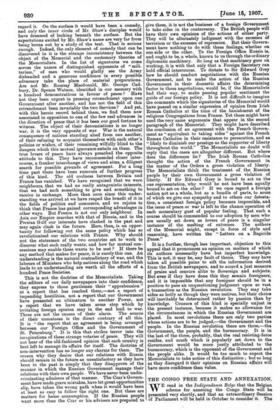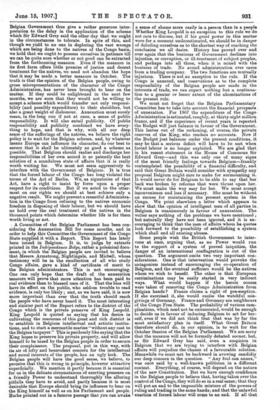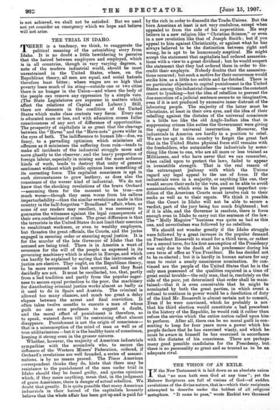THE CONGO FREE STATE AND ANNEXATION.
WE read in the Independence Beige that the Belgian scheme for annexing the Congo State will be presented very shortly, and that an extraordinary Session of Parliament will be held in October to consider it. The Belgian Government thus give a rather generous inter- pretation to the delay in the application of the scheme which Sir Edward Grey said the other day that we ought in the circumstances to tolerate. In spite of this, and though we yield to no one in deploring the vast wrongs which are being done to the natives of the Congo basin, we hold that we ought to possess ourselves in patience till we can be quite sure whether or not good can be extracted from the forthcoming measure. Even if the measure in its first form offers little promise of justice and decent treatment for the natives, we need not abandon the hope that it may be made a better measure in October. The truth is that the opinion of the Belgian people, owing to gross misrepresentations of the character of the Congo Administration, has never been brought to bear on the matter. If they could be enlightened in the next few months, we are sure that they would not be willing to accept a scheme which would transfer not only responsi- bility (and possibly expenditure) to their shoulders, but also a great weight of dishonour. Annexation must surely mean, in the long run if not at once, a sense of public responsibility. It will also entail publicity. Of public responsibility and publicity combined we have every- thing to hope, and that is why, with all our deep sense of the sufferings of the natives, we believe the right policy is to wait for the Belgian scheme, and, by whatever means Europe can influence its character, do our best to secure that it shall be ultimately as good a scheme as possible. That Belgium should realise and discharge her responsibilities of her own accord is so patently the best solution of a scandalous state of affairs that it is really worth waiting for. We must not seem aggressively to ieterfere with the Government of Belgium. It is true that the forced labour of the Congo has long violated the terms of the Act of Berlin. We, as signatories of that Act, have a right to insist by force upon a proper respect for its conditions. But if we acted to the utter- most on our rights we should at best achieve only a negative result. We might prevent a resentful Administra- ten in the Congo from refusing to the natives economic freedom in disposing of their labour, but we should have no hold over the real treatment of the natives in the thousand points which determine whether life is for them worth living or not.
A Committee of the Belgian Parliament has been con- sidering the Annexation Bill for some months, and in order to help this Committee the Government of the Congo State supplied it with a Report. This Report has lately been issued in Belgium. It is, to judge by extracts printed in the Inclependanca Beige, rather a polemical docu- ment, in which the Belgian people are invited to believe that Messrs. Armstrong, Nightingale, and Michell, whose testimony will be in the recollection of all who study Congo affairs, gave a kind of certificate of merit to the Belgian administrators. This is not encouraging. One can only hope that the draft of the annexation measure will prove that more attention has been paid to real evidence than to biassed uses of it. That the bias will have its effect on the public, who seldom trouble to read evidence, is only too likely ; and, as we have said, it is now more important than ever that the truth should reach the people who have never heard it. The most interesting and sinister part of the Report refers to the district of the Congo which is the private preserve of King Leopold. King Leopold is quoted as saying that his desire in cultivating the resources of this great and rich district is to establish in Belgium intellectual and artistic institu- tions, and to start a mercantile marine "without any cost to the Belgian taxpayer." This is perilously like saying that the King hopes to preserve his private property, and will allow himself to be taxed by the Belgian people in order to secure their complaisance. The proposal, put in this way, with its air of lofty and benevolent concern for the intellectual and moral interests of the people, has an ugly look. The Belgian people will have the good sense, we believe, to perceive that this is wrong in principle, however attractive superficially. We mention it partly because it is essential for us in the delicate circumstances of exerting pressure on a friendly Power to understand thoroughly the alluring pitfalls they have to avoid, and partly because it is most desirable that Europe should bring its influence to bear on the King himself as well as on his Parliament and people. Burke pointed out in a famous passage that you can awake a sense of shame mere easily in a person than in a people Whether King Leopold is an exception to this rule we do
not care to discuss, but if his great power in this matter were for a moment underestimated, we should be in danger of deluding ourselves as to the shortest way of reaching the conclusion we all desire. istory has proved over and over again that the busineas of Government declines into injustice, or corruption, or ill-treatment of subject peoples, and perhaps into all three, when it is mixed with the business of trade. No sound administration ever came from a trading company. The two functions are mutually injnrious. There is not an exception to the rule. If the Congo is annexed, and reservations as to the complete responsibility of the Belgian people are made in the interests of trade, we can expect nothing but a continua- tion to a greater or lesser extent of the abominations of the present rule.
We muet not forget that the Belgian Parliamentary Committee has to take into account the financial prospects of annexation. For 1907 the expenditure of the Congo .
Administration is estimated, roughly, at thirty-eight million francs, and if the experience of recent years is repeated the Budget will just balance in favour of the Government.
This leaves out of the reckoning, of course, the private reserves of the King, who renders no accounts. Now if the Budget just balances under the present conditions, it may be that a serious deficit will have to , be met when forced labour is no longer exploited. We are glad that in his recent statement in the Bongo of Commons Sir Edward Grey—and this was only one of many signs of the most friendly feelings towards Belgium—frankly contemplated the possibility of a ffnancial difficulty, and said that Great Britain would consider with sympathy any proposal Belgium might care to make for surmounting it. It would never do for Belgium to be able to say that her, back was broken by reforms that were thrust upon her, We must make the way easy for her. We must accept ineonvenience and loss if necessary. She must be without an excuse for maintaining the present system in the Congo. We print elsewhere a letter which appears to show that the opinion of intelligent men of all parties in.
Belgium is unanimously in favonr of annexation. The writer says nothing of the problems we have mentioned ; but naturally they have not been ignored, and it is en- couraging to think that the men of affairs whom he quotes look forward to the possibility of establishing a system which shall end all existing abuses.
Some people wish the British Government to inter- vene at once, arguing that, as no Power would run to the support of a system of proved iniquities, the danger of an international conflagration is out of the question. The argument omits two very important con- siderations. One is that intervention would provoke the antagonism instead of encouraging the co-operation of Belgium, and the eventual sufferers would be the natives whom we wish to benefit. The other is that European recriminations may be easily started in very indirect ways. What would happen if the heroic course were taken of removing the Congo Administration from Belgian hands? France claims a, right of pre-emption. If she exercised it, she would excite the watchful mis- givings of Germany. France and Germany are neighbours of the Congo Free State. The probability of various com- plications, which need not be enumerated, would be enough to decide us in favour of inducing Belgium to act for her- self, even if we did not think that that was by far the most satisfactory plan in itself. What Great Britain therefore should do, in our opinion, is to wait for the October Session of the Belgian Parliament. We are sorry that the measure will not be formally debated sooner, but,
as Sir Edward Grey has said, even a, suspicion in Belgium that we are trying to interfere with Belgian affairs will prejudice the chance of a favourable solution. Meanwhile we must not be backward in avowing candidly our deep concern in the question. "Any fool can annex,' was once said by a well-known politician in a different context. Everything, of course, will depend on the nature
of the new Constitution. But we have enough confidence
in the Belgian people to believe that, having taken over the control of the Congo, they will do so in s real sense; that they
will put an end to the impossible mixture of the powers of ruling and trading in the same hands; and that the unlawful exaction of forced labour will Come tO an end. If all that is not achieved, we shall not be satisfied. But we need not yet consider an emergency which we hope and believe will not arise.








































 Previous page
Previous page